考研英语阅读精选为什么数学难学
- 格式:doc
- 大小:110.50 KB
- 文档页数:9
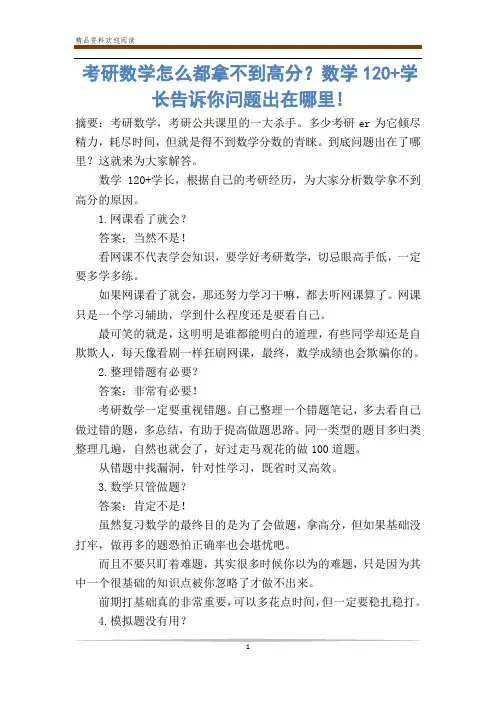
考研数学怎么都拿不到高分?数学120+学长告诉你问题出在哪里!摘要:考研数学,考研公共课里的一大杀手。
多少考研er为它倾尽精力,耗尽时间,但就是得不到数学分数的青睐。
到底问题出在了哪里?这就来为大家解答。
数学120+学长,根据自己的考研经历,为大家分析数学拿不到高分的原因。
1.网课看了就会?答案:当然不是!看网课不代表学会知识,要学好考研数学,切忌眼高手低,一定要多学多练。
如果网课看了就会,那还努力学习干嘛,都去听网课算了。
网课只是一个学习辅助,学到什么程度还是要看自己。
最可笑的就是,这明明是谁都能明白的道理,有些同学却还是自欺欺人,每天像看剧一样狂刷网课,最终,数学成绩也会欺骗你的。
2.整理错题有必要?答案:非常有必要!考研数学一定要重视错题。
自己整理一个错题笔记,多去看自己做过错的题,多总结,有助于提高做题思路。
同一类型的题目多归类整理几遍,自然也就会了,好过走马观花的做100道题。
从错题中找漏洞,针对性学习,既省时又高效。
3.数学只管做题?答案:肯定不是!虽然复习数学的最终目的是为了会做题,拿高分,但如果基础没打牢,做再多的题恐怕正确率也会堪忧吧。
而且不要只盯着难题,其实很多时候你以为的难题,只是因为其中一个很基础的知识点被你忽略了才做不出来。
前期打基础真的非常重要,可以多花点时间,但一定要稳扎稳打。
4.模拟题没有用?答案:不是!不光光是真题重要,模拟题也不能忽视,有精力的话当然要都做一下,考题的难度已经上升,多做一些题总是有好处的,可以让你在考场上更自如。
很多模拟题都有押题性质,就算压不中题,也可以让自己宽心嘛!5.计算能力很重要?答案:很重要!可以说计算能力和解题方法同样重要,简单的题目可能会在计算上增加难度,没必要因为计算能力,明明会做的题得不到分。
尤其是在考场上,肯定会耽误后边题目的发挥。
相比解题,计算还是很容易掌握的。
6.模拟考试可有可无?答案:必须有!备考后期,不仅做题要注意控制时间,而且要适当给自己安排几次模拟考试,除了把握时间还能提前熟悉一下考场上的做题节奏。
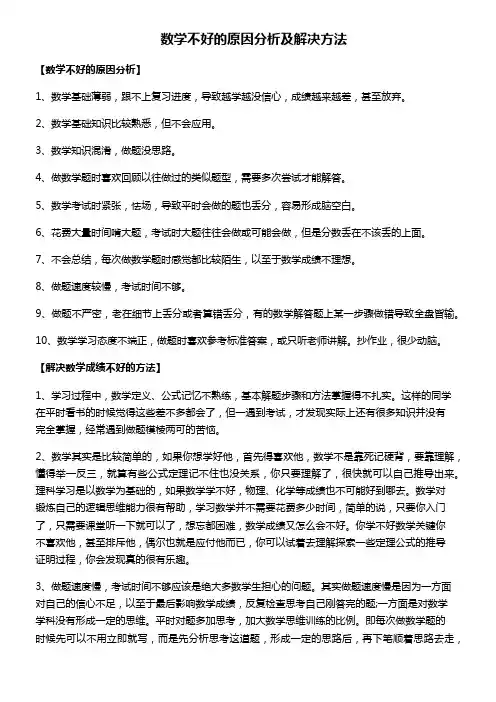
数学不好的原因分析及解决方法【数学不好的原因分析】1、数学基础薄弱,跟不上复习进度,导致越学越没信心,成绩越来越差,甚至放弃。
2、数学基础知识比较熟悉,但不会应用。
3、数学知识混淆,做题没思路。
4、做数学题时喜欢回顾以往做过的类似题型,需要多次尝试才能解答。
5、数学考试时紧张,怯场,导致平时会做的题也丢分,容易形成脑空白。
6、花费大量时间啃大题,考试时大题往往会做或可能会做,但是分数丢在不该丢的上面。
7、不会总结,每次做数学题时感觉都比较陌生,以至于数学成绩不理想。
8、做题速度较慢,考试时间不够。
9、做题不严密,老在细节上丢分或者算错丢分,有的数学解答题上某一步骤做错导致全盘皆输。
10、数学学习态度不端正,做题时喜欢参考标准答案,或只听老师讲解。
抄作业,很少动脑。
【解决数学成绩不好的方法】1、学习过程中,数学定义、公式记忆不熟练,基本解题步骤和方法掌握得不扎实。
这样的同学在平时看书的时候觉得这些差不多都会了,但一遇到考试,才发现实际上还有很多知识并没有完全掌握,经常遇到做题模棱两可的苦恼。
2、数学其实是比较简单的,如果你想学好他,首先得喜欢他,数学不是靠死记硬背,要靠理解,懂得举一反三,就算有些公式定理记不住也没关系,你只要理解了,很快就可以自己推导出来。
理科学习是以数学为基础的,如果数学学不好,物理、化学等成绩也不可能好到哪去。
数学对锻炼自己的逻辑思维能力很有帮助,学习数学并不需要花费多少时间,简单的说,只要你入门了,只需要课堂听一下就可以了,想忘都困难,数学成绩又怎么会不好。
你学不好数学关键你不喜欢他,甚至排斥他,偶尔也就是应付他而已,你可以试着去理解探索一些定理公式的推导证明过程,你会发现真的很有乐趣。
3、做题速度慢,考试时间不够应该是绝大多数学生担心的问题。
其实做题速度慢是因为一方面对自己的信心不足,以至于最后影响数学成绩,反复检查思考自己刚答完的题;一方面是对数学学科没有形成一定的思维。
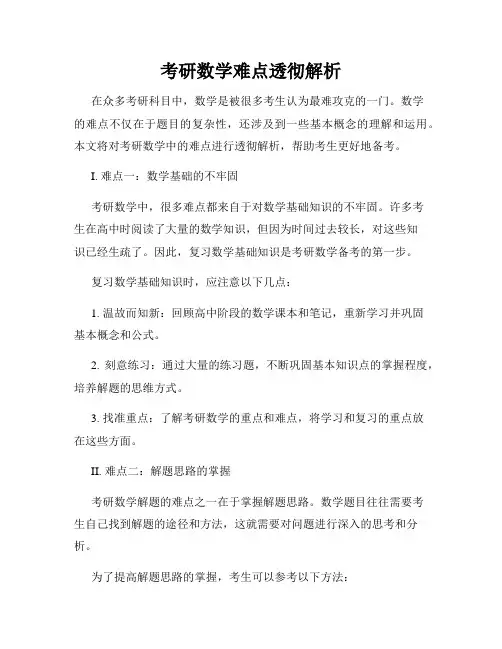
考研数学难点透彻解析在众多考研科目中,数学是被很多考生认为最难攻克的一门。
数学的难点不仅在于题目的复杂性,还涉及到一些基本概念的理解和运用。
本文将对考研数学中的难点进行透彻解析,帮助考生更好地备考。
I. 难点一:数学基础的不牢固考研数学中,很多难点都来自于对数学基础知识的不牢固。
许多考生在高中时阅读了大量的数学知识,但因为时间过去较长,对这些知识已经生疏了。
因此,复习数学基础知识是考研数学备考的第一步。
复习数学基础知识时,应注意以下几点:1. 温故而知新:回顾高中阶段的数学课本和笔记,重新学习并巩固基本概念和公式。
2. 刻意练习:通过大量的练习题,不断巩固基本知识点的掌握程度,培养解题的思维方式。
3. 找准重点:了解考研数学的重点和难点,将学习和复习的重点放在这些方面。
II. 难点二:解题思路的掌握考研数学解题的难点之一在于掌握解题思路。
数学题目往往需要考生自己找到解题的途径和方法,这就需要对问题进行深入的思考和分析。
为了提高解题思路的掌握,考生可以参考以下方法:1. 多分析解题过程:在练习解题过程中,多分析他人的解题思路,了解他们是如何找到解题途径的。
2. 思维导图法:使用思维导图法可以帮助考生整理解题的思路,抓住重点,找到合适的解题方法。
3. 积累解题经验:通过大量的解题训练,积累解题经验,形成自己独特的解题思维模式。
III. 难点三:时间管理和策略的制定考研数学的时间分配和策略制定也是一个难点。
数学题目通常需要较长的时间来解决,而考试的时间是有限的。
因此,考生需要在备考过程中学会合理分配时间,并制定解题策略。
在解决时间管理和策略制定的难题时,可以采取以下措施:1. 模拟考试:在备考过程中,进行模拟考试,模拟真实考试的时间限制,从而提高自己在有限时间内解题的速度。
2. 切割解题过程:对于一道复杂的数学题目,可以将其分割成几个小步骤,逐步解决,这样可以更好地把控时间。
3. 制定复习计划:事先制定一个详细的复习计划,合理安排每天的复习时间,确保能够充分复习所有的知识点。
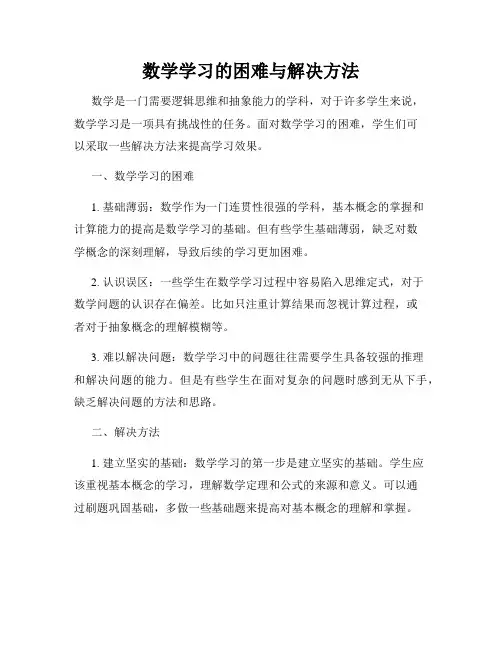
数学学习的困难与解决方法数学是一门需要逻辑思维和抽象能力的学科,对于许多学生来说,数学学习是一项具有挑战性的任务。
面对数学学习的困难,学生们可以采取一些解决方法来提高学习效果。
一、数学学习的困难1. 基础薄弱:数学作为一门连贯性很强的学科,基本概念的掌握和计算能力的提高是数学学习的基础。
但有些学生基础薄弱,缺乏对数学概念的深刻理解,导致后续的学习更加困难。
2. 认识误区:一些学生在数学学习过程中容易陷入思维定式,对于数学问题的认识存在偏差。
比如只注重计算结果而忽视计算过程,或者对于抽象概念的理解模糊等。
3. 难以解决问题:数学学习中的问题往往需要学生具备较强的推理和解决问题的能力。
但是有些学生在面对复杂的问题时感到无从下手,缺乏解决问题的方法和思路。
二、解决方法1. 建立坚实的基础:数学学习的第一步是建立坚实的基础。
学生应该重视基本概念的学习,理解数学定理和公式的来源和意义。
可以通过刷题巩固基础,多做一些基础题来提高对基本概念的理解和掌握。
2. 正确认识数学:学生需要正确理解数学的本质和目的。
数学不仅仅是一门考试科目,更是一种描述和分析现实世界的工具。
学生应该注重培养逻辑和抽象思维能力,从而理解数学的本质和价值。
3. 寻找解题方法:解决数学问题的关键是找到解题的方法和思路。
学生可以通过与同学交流、请教老师或参考教材上的解题思路来解决问题。
对于一些复杂的题目,可以尝试将其分解为更简单的步骤,逐步解决。
4. 多练习、多总结:数学学习需要大量的练习和总结。
学生应该进行系统的练习,选择不同难度的题目,在实践中提高解题能力和思维逻辑。
同时,学生也应该及时总结,归纳解题方法和技巧,以便在以后的学习中能够灵活运用。
5. 培养自信心:数学学习中遇到困难是正常的,学生应该树立正确的学习态度和自信心,相信自己可以克服困难。
遇到困难时,可以多向老师和同学请教,相互支持和鼓励。
总结:数学学习的困难并不可怕,只要学生采取正确的解决方法,都能够逐渐提高数学学习的效果。
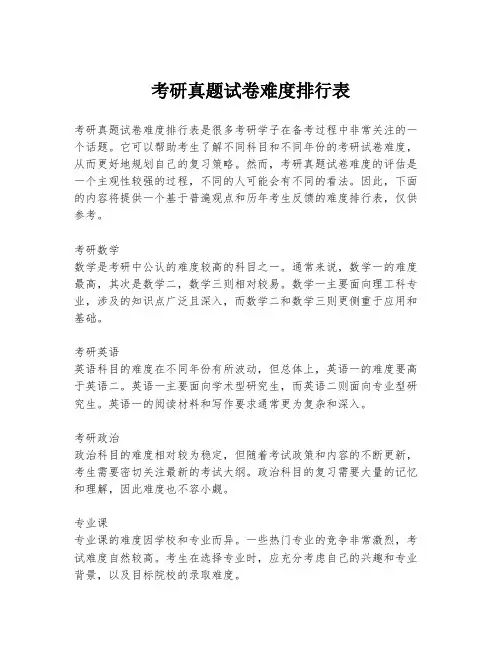
考研真题试卷难度排行表考研真题试卷难度排行表是很多考研学子在备考过程中非常关注的一个话题。
它可以帮助考生了解不同科目和不同年份的考研试卷难度,从而更好地规划自己的复习策略。
然而,考研真题试卷难度的评估是一个主观性较强的过程,不同的人可能会有不同的看法。
因此,下面的内容将提供一个基于普遍观点和历年考生反馈的难度排行表,仅供参考。
考研数学数学是考研中公认的难度较高的科目之一。
通常来说,数学一的难度最高,其次是数学二,数学三则相对较易。
数学一主要面向理工科专业,涉及的知识点广泛且深入,而数学二和数学三则更侧重于应用和基础。
考研英语英语科目的难度在不同年份有所波动,但总体上,英语一的难度要高于英语二。
英语一主要面向学术型研究生,而英语二则面向专业型研究生。
英语一的阅读材料和写作要求通常更为复杂和深入。
考研政治政治科目的难度相对较为稳定,但随着考试政策和内容的不断更新,考生需要密切关注最新的考试大纲。
政治科目的复习需要大量的记忆和理解,因此难度也不容小觑。
专业课专业课的难度因学校和专业而异。
一些热门专业的竞争非常激烈,考试难度自然较高。
考生在选择专业时,应充分考虑自己的兴趣和专业背景,以及目标院校的录取难度。
综合分析综合来看,考研真题试卷的难度排行并没有一个固定的标准,它受到多种因素的影响,包括考生的个人基础、备考时间、考试当年的题目设置等。
因此,考生在备考时应注重基础知识的扎实掌握,同时,适当关注历年真题和模拟题,以提高自己的应试能力。
最后,考生应保持积极的心态,合理安排复习计划,相信通过自己的努力,一定能够克服考研过程中的困难,取得理想的成绩。
考研是一个长期而艰苦的过程,但只要坚持不懈,成功就在眼前。
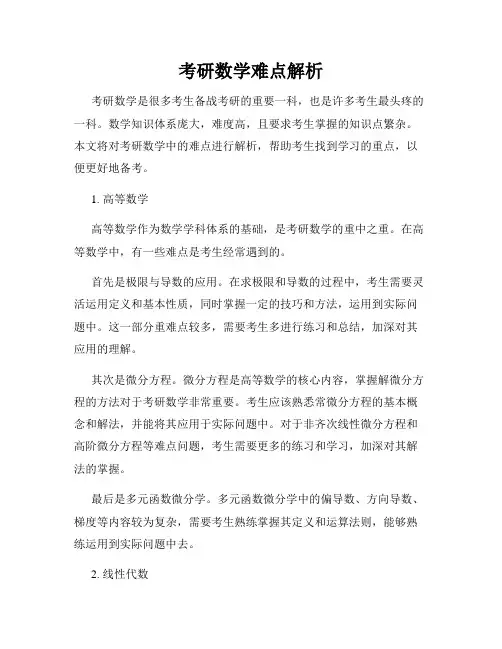
考研数学难点解析考研数学是很多考生备战考研的重要一科,也是许多考生最头疼的一科。
数学知识体系庞大,难度高,且要求考生掌握的知识点繁杂。
本文将对考研数学中的难点进行解析,帮助考生找到学习的重点,以便更好地备考。
1. 高等数学高等数学作为数学学科体系的基础,是考研数学的重中之重。
在高等数学中,有一些难点是考生经常遇到的。
首先是极限与导数的应用。
在求极限和导数的过程中,考生需要灵活运用定义和基本性质,同时掌握一定的技巧和方法,运用到实际问题中。
这一部分重难点较多,需要考生多进行练习和总结,加深对其应用的理解。
其次是微分方程。
微分方程是高等数学的核心内容,掌握解微分方程的方法对于考研数学非常重要。
考生应该熟悉常微分方程的基本概念和解法,并能将其应用于实际问题中。
对于非齐次线性微分方程和高阶微分方程等难点问题,考生需要更多的练习和学习,加深对其解法的掌握。
最后是多元函数微分学。
多元函数微分学中的偏导数、方向导数、梯度等内容较为复杂,需要考生熟练掌握其定义和运算法则,能够熟练运用到实际问题中去。
2. 线性代数线性代数在考研数学中的地位同样十分重要,其中也存在一些难点。
首先是线性方程组。
考生需要掌握高斯消元法、矩阵求逆法、向量空间的基础知识,同时要灵活运用这些知识来解决线性方程组问题,特别是对于系数矩阵为特殊形式、线性方程组个数与未知数个数不一致等特殊情况,需要考生能够准确判断解的情况。
其次是特征值与特征向量。
在求解特征值与特征向量时,考生需要掌握特征值和特征向量的概念和性质,同时灵活运用特征值和特征向量的定义和计算方法。
最后是正交与正交变换。
正交与正交变换是线性代数中的重点内容,也是许多考生的难点。
要熟悉正交的定义和性质,了解正交基、正交补和最小二乘拟合等概念,并能够应用到实际问题中去。
3. 概率与统计概率与统计是考研数学中相对较为容易的一部分,但也存在一些难点需要考生注意。
首先是随机变量和概率分布。
考生需要理解随机变量的概念和性质,熟悉常见的概率分布,包括离散型概率分布和连续型概率分布,并能够准确计算概率和期望。
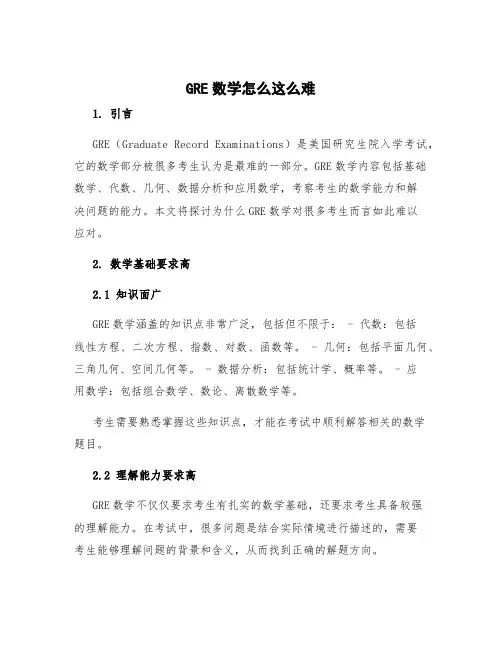
GRE数学怎么这么难1. 引言GRE(Graduate Record Examinations)是美国研究生院入学考试,它的数学部分被很多考生认为是最难的一部分。
GRE数学内容包括基础数学、代数、几何、数据分析和应用数学,考察考生的数学能力和解决问题的能力。
本文将探讨为什么GRE数学对很多考生而言如此难以应对。
2. 数学基础要求高2.1 知识面广GRE数学涵盖的知识点非常广泛,包括但不限于: - 代数:包括线性方程、二次方程、指数、对数、函数等。
- 几何:包括平面几何、三角几何、空间几何等。
- 数据分析:包括统计学、概率等。
- 应用数学:包括组合数学、数论、离散数学等。
考生需要熟悉掌握这些知识点,才能在考试中顺利解答相关的数学题目。
2.2 理解能力要求高GRE数学不仅仅要求考生有扎实的数学基础,还要求考生具备较强的理解能力。
在考试中,很多问题是结合实际情境进行描述的,需要考生能够理解问题的背景和含义,从而找到正确的解题方向。
3. 题目设计复杂3.1 多重解题思路GRE数学题目经常会设计多个解题思路,考察考生的灵活性和多元思考能力。
同一道题目可能有多种解题方法,考生需要根据具体情况选择最合适的解题思路。
3.2 推理能力和创造性要求GRE数学题目注重考察考生的推理能力和创造性思维。
有些题目需要考生根据给定条件进行推理,找出隐藏的规律或者解决方案。
这对考生的思维能力提出了更高的要求。
4. 限时压力大GRE数学考试时间有限,考生需要在规定时间内完成大量的题目。
因此,考生在解题过程中不仅要保持高效率,还要正确率高,没有太多的时间去纠错。
5. 考试策略不当5.1 缺乏备考规划许多考生在备考GRE数学时缺乏系统的规划,没有合理安排时间和内容。
他们可能只是随机地做一些题目,而不知道具体应该从哪些知识点下手。
这样做对于提高数学能力是没有帮助的。
5.2 缺乏练习GRE数学的难点在于考察考生将数学知识应用到实际问题中的能力,而不只是背诵公式和定义。
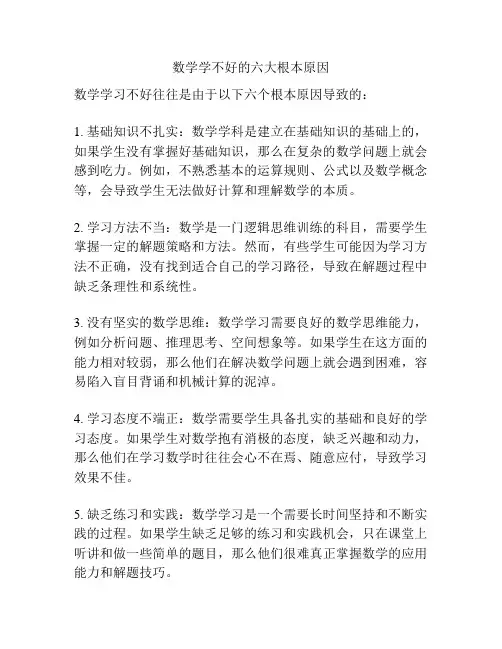
数学学不好的六大根本原因数学学习不好往往是由于以下六个根本原因导致的:1. 基础知识不扎实:数学学科是建立在基础知识的基础上的,如果学生没有掌握好基础知识,那么在复杂的数学问题上就会感到吃力。
例如,不熟悉基本的运算规则、公式以及数学概念等,会导致学生无法做好计算和理解数学的本质。
2. 学习方法不当:数学是一门逻辑思维训练的科目,需要学生掌握一定的解题策略和方法。
然而,有些学生可能因为学习方法不正确,没有找到适合自己的学习路径,导致在解题过程中缺乏条理性和系统性。
3. 没有坚实的数学思维:数学学习需要良好的数学思维能力,例如分析问题、推理思考、空间想象等。
如果学生在这方面的能力相对较弱,那么他们在解决数学问题上就会遇到困难,容易陷入盲目背诵和机械计算的泥淖。
4. 学习态度不端正:数学需要学生具备扎实的基础和良好的学习态度。
如果学生对数学抱有消极的态度,缺乏兴趣和动力,那么他们在学习数学时往往会心不在焉、随意应付,导致学习效果不佳。
5. 缺乏练习和实践:数学学习是一个需要长时间坚持和不断实践的过程。
如果学生缺乏足够的练习和实践机会,只在课堂上听讲和做一些简单的题目,那么他们很难真正掌握数学的应用能力和解题技巧。
6. 缺乏自信心:数学学习需要学生具备一定的自信心。
如果学生对自己的数学能力缺乏信心,容易产生焦虑和恐惧心理。
这种情绪会影响到学生在解题过程中的思考和表现,导致学习成绩下降。
综上所述,数学学不好的根本原因主要包括基础知识不扎实、学习方法不当、缺乏数学思维能力、学习态度不端正、缺乏练习和实践,以及缺乏自信心。
要提高数学学习成绩,学生需要在这些方面下功夫,建立起良好的数学学习基础。
当我们分析数学学习困难的根本原因时,可以进一步从以下几个方面进行探讨。
首先,很多学生在数学教育的早期阶段就没有形成良好的数学思维。
数学思维是数学学习的核心,它包括分析问题、归纳推理、逻辑思维和空间想象等方面的能力。
然而,与其他学科不同,数学思维不能靠死记硬背或机械的应用所获取。
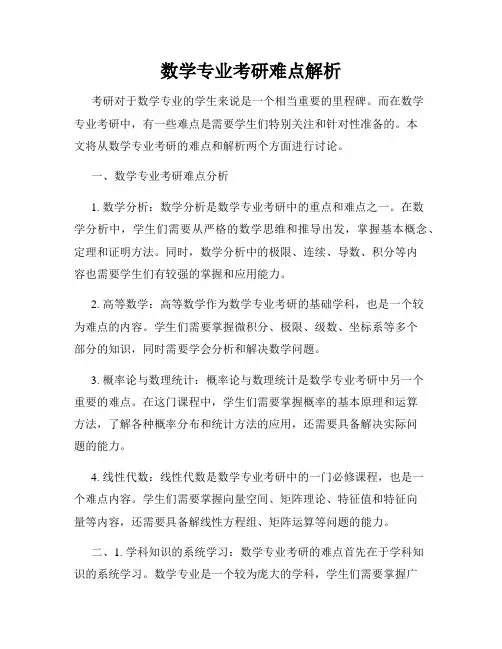
数学专业考研难点解析考研对于数学专业的学生来说是一个相当重要的里程碑。
而在数学专业考研中,有一些难点是需要学生们特别关注和针对性准备的。
本文将从数学专业考研的难点和解析两个方面进行讨论。
一、数学专业考研难点分析1. 数学分析:数学分析是数学专业考研中的重点和难点之一。
在数学分析中,学生们需要从严格的数学思维和推导出发,掌握基本概念、定理和证明方法。
同时,数学分析中的极限、连续、导数、积分等内容也需要学生们有较强的掌握和应用能力。
2. 高等数学:高等数学作为数学专业考研的基础学科,也是一个较为难点的内容。
学生们需要掌握微积分、极限、级数、坐标系等多个部分的知识,同时需要学会分析和解决数学问题。
3. 概率论与数理统计:概率论与数理统计是数学专业考研中另一个重要的难点。
在这门课程中,学生们需要掌握概率的基本原理和运算方法,了解各种概率分布和统计方法的应用,还需要具备解决实际问题的能力。
4. 线性代数:线性代数是数学专业考研中的一门必修课程,也是一个难点内容。
学生们需要掌握向量空间、矩阵理论、特征值和特征向量等内容,还需要具备解线性方程组、矩阵运算等问题的能力。
二、1. 学科知识的系统学习:数学专业考研的难点首先在于学科知识的系统学习。
数学专业是一个较为庞大的学科,学生们需要掌握广泛的数学知识,并且需要将这些知识有机结合起来,形成系统的学科知识结构。
2. 解题方法的灵活运用:数学专业考研的难点还在于解题方法的灵活运用。
考研对于学生们来说,注重的是解题思路和方法的运用,而不仅仅是死记硬背知识点。
学生们需要灵活运用不同的解题方法,形成自己的解题能力。
3. 解题的时效性和准确性:数学专业考研的难点还在于解题的时效性和准确性。
由于考试时间的限制,学生们需要在规定的时间内解答大量的数学题目。
在这个过程中,学生们需要保持较高的准确率,并且能够快速且准确地解答题目。
4. 考试的应试技巧:数学专业考研的难点还在于考试的应试技巧。
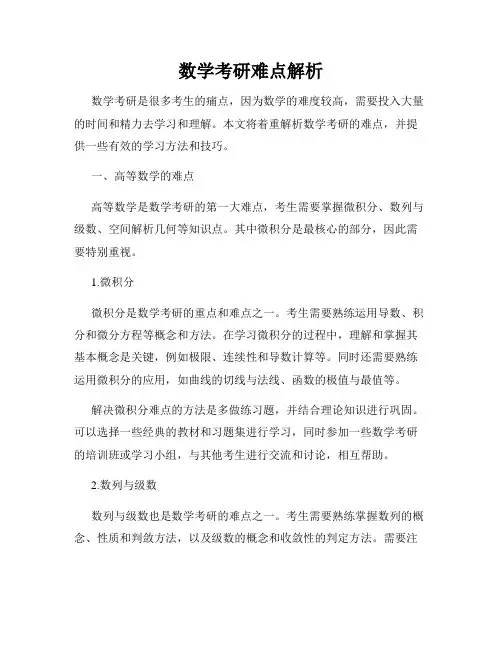
数学考研难点解析数学考研是很多考生的痛点,因为数学的难度较高,需要投入大量的时间和精力去学习和理解。
本文将着重解析数学考研的难点,并提供一些有效的学习方法和技巧。
一、高等数学的难点高等数学是数学考研的第一大难点,考生需要掌握微积分、数列与级数、空间解析几何等知识点。
其中微积分是最核心的部分,因此需要特别重视。
1.微积分微积分是数学考研的重点和难点之一。
考生需要熟练运用导数、积分和微分方程等概念和方法。
在学习微积分的过程中,理解和掌握其基本概念是关键,例如极限、连续性和导数计算等。
同时还需要熟练运用微积分的应用,如曲线的切线与法线、函数的极值与最值等。
解决微积分难点的方法是多做练习题,并结合理论知识进行巩固。
可以选择一些经典的教材和习题集进行学习,同时参加一些数学考研的培训班或学习小组,与其他考生进行交流和讨论,相互帮助。
2.数列与级数数列与级数也是数学考研的难点之一。
考生需要熟练掌握数列的概念、性质和判敛方法,以及级数的概念和收敛性的判定方法。
需要注意的是,对于级数的和函数和级数项函数的性质和计算方法也需要进行深入理解和掌握。
解决数列与级数难点的方法是通过大量的练习和实例分析来加深对知识的理解和应用。
可以选择一些经典教材和习题集进行针对性的学习,同时注意总结和归纳规律,提高解题的速度和准确性。
3.空间解析几何空间解析几何是数学考研的又一大难点,考生需要掌握点、直线、平面的方程和性质,以及空间曲线和球面的方程和性质。
此外,还需要熟练掌握空间向量和行列式的基本概念和运算。
解决空间解析几何难点的方法是通过大量的几何问题练习巩固基本知识,并注意结合实际问题加深对知识的理解和应用。
同时,可以使用一些辅助工具和技巧,如画图、几何推演等,提高解题效率和准确性。
二、线性代数的难点线性代数是数学考研的第二大难点,考生需要掌握矩阵、行列式、特征值与特征向量等知识点。
其中矩阵和行列式是最核心的部分,需要特别注意。
1.矩阵矩阵是线性代数的重点和难点之一。
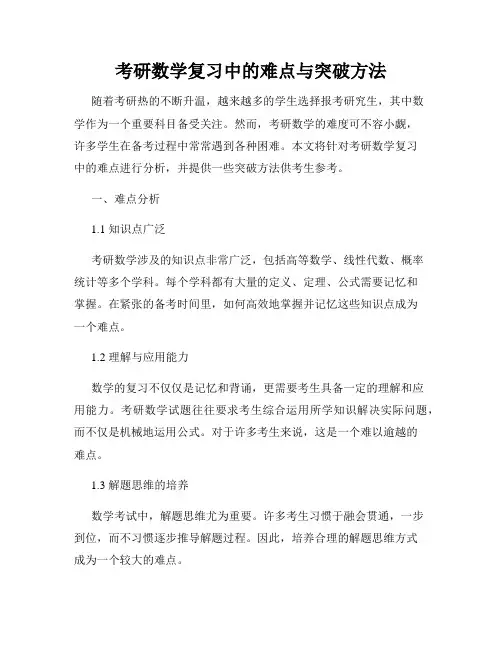
考研数学复习中的难点与突破方法随着考研热的不断升温,越来越多的学生选择报考研究生,其中数学作为一个重要科目备受关注。
然而,考研数学的难度可不容小觑,许多学生在备考过程中常常遇到各种困难。
本文将针对考研数学复习中的难点进行分析,并提供一些突破方法供考生参考。
一、难点分析1.1 知识点广泛考研数学涉及的知识点非常广泛,包括高等数学、线性代数、概率统计等多个学科。
每个学科都有大量的定义、定理、公式需要记忆和掌握。
在紧张的备考时间里,如何高效地掌握并记忆这些知识点成为一个难点。
1.2 理解与应用能力数学的复习不仅仅是记忆和背诵,更需要考生具备一定的理解和应用能力。
考研数学试题往往要求考生综合运用所学知识解决实际问题,而不仅是机械地运用公式。
对于许多考生来说,这是一个难以逾越的难点。
1.3 解题思维的培养数学考试中,解题思维尤为重要。
许多考生习惯于融会贯通,一步到位,而不习惯逐步推导解题过程。
因此,培养合理的解题思维方式成为一个较大的难点。
二、突破方法2.1 制定详细的学习计划针对数学知识点广泛的特点,考生应制定详细的学习计划。
首先,明确每个学科的重点知识点,分阶段有序地进行复习。
其次,合理安排复习时间,将复习内容分解成小块,每天逐步完成,避免盲目堆积知识。
最后,制定合理的复习进度,保证每个学科都有足够的时间进行巩固和深化。
2.2 理解与应用相结合在复习过程中,考生不仅要记忆公式和定理,更要加强对数学原理的理解。
阅读相关的教材或参考书籍,掌握知识点的来龙去脉。
并且要将知识应用到实际问题中,探索解决问题的思路和方法。
通过实际应用,加深对知识点的理解。
2.3 练习题的重要性通过大量的练习题,考生可以提高解题的能力。
特别是通过做一些经典的、难度适中的试题,考生可以熟悉不同类型题目的解题方法和思路,为应对考试做好准备。
同时,通过练习也可以帮助考生找到自己解题过程中的薄弱环节,及时进行针对性的强化练习。
2.4 合理的解题思维方式数学中,灵活的解题思维非常重要。
分析考研数学考试难点和解题技巧在即将到来的2023年考研数学考试中,学生需要掌握多项知识和技巧,同时充分准备才能取得理想的成绩。
但是,从过去的考试经验来看,考研数学考试往往是学生的难点之一,需要进行有针对性的备考。
在本文中,我们将分析考研数学考试的难点和解题技巧,并给出一些实用的备考建议和注意事项。
1. 考研数学考试的难点考研数学考试的难点主要包括以下几个方面:(1)知识点繁多。
考研数学内容涉及线性代数、概率论、数值计算、复变函数与积分变换等多个方向,而每个方向又包含了大量的知识点。
对于许多学生来说,需要花费较长的时间来巩固和完善各种知识点。
(2)难度较高。
考研数学考试通常比本科阶段的数学考试难度要高得多,特别是考试题目处于一定难度的境界。
同时,在时间紧迫的情况下,许多考生难以在短时间内准确解答这些难题。
(3)答题技巧要求高。
在考试过程中,许多考生不仅需要掌握相关的知识点,还需要具备一定的答题技巧,例如如何运用公式、化简计算、分析题目等。
这需要经过长时间的练习和实践才能熟练掌握。
2. 解题技巧为了顺利应对考研数学考试中的各种难点,学生需要掌握一定的解题技巧。
在此我们列出几个常用的解题技巧:(1)掌握基本知识。
在了解题目背景之后,考生首先要查看是否涉及到基本的数学知识,例如公式、定义、引理等等。
掌握这些基础知识有助于快速理解题目和解答问题。
(2)阅读理解。
在考试过程中,阅读理解能力也非常重要。
学生需要仔细阅读题目,并理解题目的意思和寻找解题的方法。
阅读理解需要考生长期培养,并且需要在考前进行充分的训练和巩固。
(3)充分利用公式。
在解题过程中,学生应该充分利用公式,并运用到合适的环节来简化解题过程。
然而,为了避免公式使用错误或者混淆,考生应该花时间熟悉并弄清各种常用公式的使用方法。
(4)画图助理解。
在解题时,对于一些复杂的问题,学生可以借助画图等方式来理解问题,并找到更好的解题思路。
但是需要注意的是,绘图只是一种辅助手段,不应该纯凭直觉下结论。
考研英语阅读历年真题难度考研英语阅读是考研英语考试中的重要组成部分,历年真题的难度分析对于考生备考具有重要的指导意义。
通过对历年真题的分析,我们可以发现考研英语阅读的难度主要体现在以下几个方面:首先,词汇量的要求。
考研英语阅读中的文章往往涉及大量的专业词汇和生僻词汇,这对考生的词汇量提出了较高的要求。
考生需要掌握足够的词汇量,才能在阅读过程中迅速识别和理解文章中的关键词和概念。
其次,长难句的理解。
考研英语阅读中的文章常常包含复杂的句型结构,如从句、倒装句等,这对考生的语法知识和理解能力提出了挑战。
考生需要具备较强的语法分析能力,才能在阅读过程中准确把握文章的逻辑关系和意义。
再次,文章结构的把握。
考研英语阅读的文章往往结构复杂,涉及多个段落和主题。
考生需要具备较强的文章结构分析能力,才能在阅读过程中迅速抓住文章的主旨和结构,从而提高阅读效率。
此外,题型的多样性。
考研英语阅读的题型多样,包括细节理解题、推理判断题、主旨大意题等。
考生需要具备较强的题型分析能力,才能在考试中迅速识别和应对不同类型的题目。
最后,时间的控制。
考研英语阅读的考试时间有限,考生需要在规定的时间内完成阅读和答题。
这对考生的阅读速度和答题效率提出了较高的要求。
考生需要通过大量的练习,提高自己的阅读速度和答题效率,才能在考试中取得理想的成绩。
综上所述,考研英语阅读的难度主要体现在词汇量、长难句理解、文章结构把握、题型多样性和时间控制等方面。
考生在备考过程中,需要针对这些难点进行有针对性的训练和准备,才能在考试中取得理想的成绩。
同时,通过分析历年真题,考生可以更好地了解考研英语阅读的难度和特点,从而有针对性地进行复习和准备。
考研数学到底难不难?难在哪?
考研数学是广大考研学子公认的重点难点,每年都有很多考研学生被数学扯了后腿。
那么,考研数学究竟难在哪?小编来告诉你。
很多考生认为我们的考研数学比较难,那么考研数学的难在什么地方呢?相信很多考生对这个问题都没有一个正确的答案。
事实上,考研数学难就难在综合性。
大家感觉到难是因为没有真正的掌握数学的综合性。
难在综合能力的考察
首先,大家需要明确的考研数学考察的就是大家的综合能力,这就从侧面告诉每一位考生,试卷上的分数和你的能力是完全的成正比的,你的能力有多少,你就能考多少分。
这就是说,各位同学在数学的复习过程中不要投机取巧,你要想取得高分,你的唯一途径就是踏踏实实的进行复习,一步一个脚印的进行复习,先打好基础,再提高自己的综合能力。
那么在综合能力的角度,广大考生又应该在复习的过程中注意知识的整体性和系统化。
怎样去提高自己的综合能力
我们考研数学的试卷在整体上的把握还是非常准确的,这也是我们考研数学的一大特点。
虽然说每年的考试题目都在改变,但是同学们要善于从变化之中发现趋势,从变化之中寻找规律。
这个不变的规律就是考试对大家在知识层面的整体上要求。
而且,我们数学的知识点往往是环环相扣,一层包含着另外一层,相互渗透。
如果你在数学的复
习过程中,如果那一方面的知识有明显的薄弱,这样很有可能造成你满盘皆输,最终在考研中沦为炮灰。
知识的系统化
所谓的系统化就是要求各位考生在复习的过程中要注意知识的体系性。
数学考研中的常见难点及解决方法随着社会的不断发展,数学考研成为了许多人提升学历、拓宽就业渠道的重要途径。
然而,数学作为一门抽象的学科,往往会给考生们带来许多难题。
本文将介绍数学考研中常见的难点,并提供相应的解决方法,帮助考生们顺利应对考试。
一、高等数学1. 极限与连续在数学分析部分,极限与连续是考研中的重点内容。
很多考生在对极限的理解上存在困难,尤其是当极限与函数的两边极限存在不一致的情况下。
为了解决这个问题,考生可以通过多做例题、归纳总结各种极限的计算方法,并且注重理论与实践相结合。
2. 级数级数是高等数学中的另一个难点。
考生们往往在理解级数的性质、计算收敛性以及应用定理时遇到困难。
为了解决这个问题,考生可以多阅读相关教材,理解级数的定义和性质,并通过做大量的习题加深理解。
二、线性代数1. 线性空间线性空间作为线性代数的基础概念,对于考生来说会带来一定的挑战。
考生们需要充分理解线性空间的定义、性质和常见的线性子空间,并能够熟练运用线性相关性与线性无关性的判定方法。
解决这个问题的方法是,考生要注重理论学习,多做例题加深对线性空间的理解。
2. 特征值与特征向量特征值与特征向量是线性代数中的重要内容,也是考生容易遇到的难点。
考生们需要通过理论学习,深入理解特征值与特征向量的定义和性质,并且能够熟练计算矩阵的特征值与特征向量。
解决这个问题的方法是,考生要勤加练习,注重实际问题与特征值特征向量的联系,加深对其的理解。
三、概率论与数理统计1. 随机变量与概率分布概率论与数理统计是数学考研中的难点之一,其中随机变量与概率分布是考生们经常会遇到的问题。
考生们需要通过学习掌握随机变量的定义和常见分布的性质,能够计算随机变量的各种数学期望、方差等。
解决这个问题的方法是,考生要理论联系实际,多通过例题和应用题,加深对随机变量的理解。
2. 参数估计与假设检验参数估计与假设检验是概率论与数理统计中的重要内容,也是考生们容易出错的地方。
英语考研真题难度系数英语考研真题难度系数随着中国高等教育的普及和竞争的加剧,越来越多的学生选择报考研究生,而英语考试是研究生考试中的重要一环。
因此,英语考研真题的难度系数备受关注。
本文将以英语考研真题难度系数为主题,探讨其影响因素和对考生的影响。
英语考研真题的难度系数是指一道题目在给定的时间内被考生正确解答的难度程度。
难度系数的高低取决于题目的复杂性、知识的深度以及解题的技巧性。
一般来说,难度系数越高,说明题目越困难,需要考生具备更高的英语水平和解题能力。
首先,英语考研真题的难度系数受到学科知识的影响。
英语考研包括阅读理解、完形填空、翻译和写作等多个部分,每个部分都涉及不同的学科知识。
对于非英语专业的考生来说,学科知识的掌握可能相对薄弱,因此他们可能会感到英语考研真题的难度系数较高。
相反,英语专业的考生可能对学科知识有更深入的了解,因此他们可能觉得英语考研真题的难度系数较低。
其次,英语考研真题的难度系数还受到题目形式的影响。
题目形式的多样性会给考生带来不同的挑战。
例如,阅读理解部分可能包括多篇文章和各种题型,如选择题、判断题和填空题等。
对于考生来说,不同的题型需要不同的解题技巧和策略。
如果考生没有充分准备或没有掌握解题技巧,他们可能会觉得英语考研真题的难度系数较高。
此外,英语考研真题的难度系数还与考生的英语水平和解题能力有关。
英语水平和解题能力是考生能否正确解答题目的关键因素。
对于英语水平较高、解题能力较强的考生来说,他们可能觉得英语考研真题的难度系数较低。
相反,对于英语水平较低、解题能力较弱的考生来说,他们可能觉得英语考研真题的难度系数较高。
英语考研真题的难度系数对考生有着重要的影响。
首先,难度系数的高低会直接影响考生的分数和排名。
难度系数较高的题目往往需要更高的解题能力和英语水平,因此考生可能会在这些题目上失分较多。
其次,难度系数的高低也会影响考生的心理状态和备考策略。
对于难度系数较高的题目,考生可能会感到压力较大,需要更加努力地备考和解题。
考研数学如何理解难点数学作为考研的一门重要科目,常常被考生认为是最难攻克的一门。
其中,数学的难点尤为突出,考生在备考过程中需要付出更多的努力和时间。
然而,只要我们有正确的理解和应对方法,解决数学难点并不是那么困难。
本文将从几个方面介绍如何理解考研数学的难点,帮助考生在备考中取得更好的成绩。
第一,培养数学思维。
数学思维是解决数学难题的关键能力,而这也是考研数学难点所在。
数学思维主要包括逻辑思维和抽象思维两方面。
逻辑思维能力可以通过解题思路的整理和逻辑推理的训练来提高;抽象思维能力可以通过学习高级数学知识和做题的过程来培养。
因此,考研数学中遇到难点时,我们应该主动培养自己的数学思维,提高自身的解题能力。
第二,深入理解数学的基本概念和原理。
数学难点通常来自于基本概念和原理的不透彻理解。
在备考过程中,我们要善于通过多角度的思考,加深对数学概念和原理的理解。
例如,在学习线性代数时,我们要理解向量空间的定义和基本性质,掌握线性变换的相关概念和定理,这样才能更好地应对数学难点。
此外,通过多做例题和习题,加深对基本概念和原理的理解也是非常有效的方法。
第三,注重数学方法的灵活运用。
在考研数学中,不同的题型往往需要不同的解题方法。
对于难点题目,我们不能固守一种解题方法,而应该多角度思考,灵活运用不同的数学方法。
例如,在解决微积分中的极限问题时,有时候可以使用泰勒展开式进行逼近,有时候可以使用夹逼定理来求解。
因此,我们需要在备考过程中,积累并总结各种不同的解题方法,灵活应用于解决难点题目。
第四,坚持练习和思考。
数学是一门需要不断练习和思考的学科。
在解决数学难点时,我们需要勤于思考,尝试多种解题思路,找到适合自己的方法。
而在备考过程中,我们也要大量练习各种难度的题目,提高自己的解题能力。
通过反复练习和思考,我们能够逐步攻克数学的难点,提高自己的数学水平。
综上所述,考研数学的难点是可以被理解和攻克的。
在备考过程中,我们应该培养数学思维,深入理解数学的基本概念和原理,注重数学方法的灵活运用,同时,坚持练习和思考,才能够解决数学难点,取得好成绩。
考研英语阅读精选-为什么数学难学————————————————————————————————作者:————————————————————————————————日期:2017考研英语阅读精选为什么数学难学?考研英语阅读真题中的文章,多摘自英美主流外刊,有时候你认识所有单词、搞清全部语法还不够,还需要了解英美文化,掌握他们的表达方式,这就是阅读的潜台词。
有时候是一些俗语和俚语,有时候是固定搭配,有时候需要借助历史、风俗、文化才能理解某种现象或表达。
总之,这些地道的英语文章背后都有潜台词,一般人不容易读出,但往往是理解文章的关键。
WhyIs It So Hard toLearn Math?为什么数学就这么难学?导读:学语言真的很难。
老实讲,它比学数学要复杂得多,也困难得多。
不过,几乎所有的小孩子都能够学习并且熟练掌握一门语言。
Language ishard. In fact, it’s infinitely hardera nd more complicatedthanmath. And yet,nearly every smallchild canlearn andmaster language.学语言真的很难。
老实讲,它比学数学要复杂得多,也困难得多。
不过,几乎所有的小孩子都能够学习并且熟练掌握一门语言。
Why is math so overwhelmingfor so many students?And how high isthe price wepay from havingsomany math-terrified or even math-illiteratepeople in oursociety?Too high, especiallyas the ability tograsp dataandpursue advanced workthat involves mathis becomingincreasingly important forboth citizens and job applicants.那到底为什么数学会成为许多学生难以逾越的鸿沟呢?因为社会上这些“数学恐惧症患者”,甚至是“数学盲”的存在,我们又得付出多大的代价呢?不用说,这代价简直太大了,尤其是在当今社会,获取数据和从事高难度工作越来越成为普通人和求职者的必备能力。
It often startswiththe problem of teaching ma th inthe abstract. Thismisses theremarkableamoun tofmathematical knowledge that wehumans alreadypossess. We knowhow tosolve forunknowns,for example. That’s algebra. We also are able to think in termsof three dimensionalspaces—that’s geometry and trigonometry. Sothismathematical language istheanalytical expressionof the way we already think.问题一开始出在数学的抽象教学上。
这就让我们错失大量数学知识,而这些知识是我们本身就具有的。
我们知道如何去解决未知的东西,那么这就是代数。
我们也知道用三维空间去思考——这就是几何学和三角学。
这门数学语言其实就是我们思维方式的解析式。
But how manyofusfeelincapable,rather than poorly taught, when we areconfrontedwiththe rigors ofmath?Howmany children who struggled to grasp mathconcepts, who lackedthenecessary tool kit, we reledto feel stupid, even demeaned?然而碰到数学难题的时候,我们当中有多少人只会觉得是自己无能,而不会归因于教育问题?又有多少孩子绞尽脑汁地去记忆数学概念,却因为缺少必要的学习工具,而觉得自己愚蠢之极,甚至变得妄自菲薄?Compare it tospoken or written language. When you make a mistake, a teacher correctsthe part that iswrong. And then youproceed. With math, if youdo n’thave the correct result, it is typicallytreated as wrong. And, as mistake aftermistake builds up, too many students simplygiveup: I can’t do math.相比起来书面语或者口语,如果你犯了错误,老师就会对此进行更正,然后你可以再继续。
而数学就不一样了,数学是如果你得不到正确答案,老师就会认定你做错了。
随着错误不断堆积,很多学生干脆破罐破摔,直接放弃了:我就是搞不懂数学。
Butmath isnot about intelligence. It’s a language thattoomany peoplenever learn,oftenbecause the education process misses the number of ways that a given person can arriveat a given solution.不过数学无关智力,而是一种许多人都未曾学习过的语言。
很多时候就是因为教育过程不注重因材施教的方法,才会让数学变得那么“难”。
That’s not afailure of children to learn.That’sa fa ilure of teaching. It’s a failure ofthe school. We should not blamethestudent. (These are children, after all.)这不是孩子学习的失败,而是教育的失败,学校的失败。
我们不该责怪学生。
(毕竟他们只是孩子而已)Partof the challenge is to identifythe gapsinknowledge, to clarify thatthe challengeis not that astudent simply doesn’t understand algebra or trigo nometry or whatever. There may be aparticular basicconcept that stands inthe way ofgoing forward in math, as well as other fields such as social sci ence or engineering.我们遇到的挑战一部分是认清知识之间的缺口,以及明白这份挑战不只是因为学生不懂代数或者三角学。
有时候我们可能会遇到某一个基本概念,它不止阻碍我们步入数学的大门,也会影响我们通往其他领域的步伐,比如社会科学或者工程学。
Overcoming this blockrequiresmoving beyond broad industrialized education andtoindividuali zed,personalized learning that allowsstudentsto find theirown way in.Showmeathousand studen tsand I’ll showyou athousand different pathways that they might take to achievemath success.要克服这一困难,我们就必须得摒弃产业化教育,因材施教,这样有助于学生找到自己的学习方法。
给我1000个学生,我就能让你看到拿下数学的1000种不同方法。
Withnew digital technologies and a massiveamountofdata collectionand analytics, we have the abilityto help students identifythe essentialconcepts they don’t understand. We have data on all th estudents that solved a particularmath problem and those thatfailedto solve it. We alsohave data onthe problems they were able to solve prio rto that.有了新的数字科技、大量的数据收集和分析学,我们有能力帮学生记住一些他们原本并不理解的基本概念。
我们收集的数据包括:对于某个特定的数学问题,能够解决和不能解决的学生情况,以及在那之前他们能够解决的问题。
So asa student recognizesthat they are struggli ng with, say, negative number concepts, they cangoback and masterthematerial—to fill in the gaps that allowsthem to go forward. And when they hitanother tough spot? They can jumpto the problemsthat allow them to master that concept. Thehopeis thatas they progress,their interest andenthusiasm increases.因此,当学生知道他们正在与,比如说负数概念艰难地做斗争,可以回过头去,掌握一些必须的材料,将知识的缺口填补完整,这样就能继续往前走。
那以后又碰到难题该怎么办?他们可以直接去解决一些特定问题,从中快速掌握该概念。
我们希望,学生在进步的过程中,自己的兴趣和热情也能一起被提高。
Weare pursuingthis approach at theuniversity level. We also are seekingto incorporate this app roach at the high school, middle school and elementarylevels.This will make it possiblefor a growing number of students topursue degrees andcareersthat they neverthought.我们现在正在大学教育中推行这一方法,也力求将其与小学、初中和高中教学结合起来。